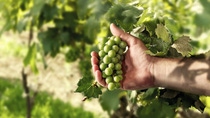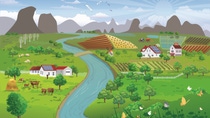China’s future farming
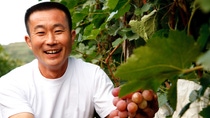
China accounts for 7% of total agricultural acreage globally, while feeding 22% of the world population. Agricultural situation here is very different from that in other countries like Japan or America. Therefore, BASF closely works with Chinese farmers to create chemistry for the sustainable future of farming.
Describing Chinese farmers as “great” without the least hesitation, Tracy Wu, Director of Business Management, Crop Protection Greater China, BASF, notes just as the new slogan says, “‘Farming, the biggest job on Earth’, is especially true for Chinese farmers.”
Statistically, China feeds 22% of the world’s population with merely 7% of the arable land. The country is the largest producer of many crops, including cotton, rice, potatoes and many other vegetables. Unlike most underdeveloped countries, China not only has successfully solved its subsistence problem but is also improving people’s dietary structure. Chinese people are now consuming more animal protein, however, improvements in the food chain also mean greater pressure in planting as animal feeds are derived from crops.
Agriculture, nevertheless, is not receiving the sufficient attention appropriate to its significance worldwide. “People live on food, and food comes from agriculture,” Wu said. “Yet, in sharp contrast with some emerging industries, agriculture may be the most overlooked industry simply because it is centuries old.”
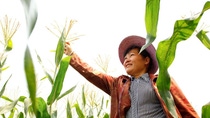
Compared with emerging industries, is agriculture – the traditional industry in the eyes of many ordinary people – running out of innovation possibilities? Not really. BASF has been actively investing in agriculture for many years. “Our commitment to agriculture is evident in research and development investment. In 2012, our Crop Protection division accounted for 6% of our global sales but 25% of total R&D investment,” Wu explained.
Yung Chung, Regional Head, Industry Team Foods & Agriculture Asia Pacific, BASF, highlighted BASF’s efforts in agricultural innovation.
“In line with our sustainable development concept, BASF’s products and solutions are offering more plant health benefits beyond diseases, insects and weeds control,” Chung said. “In addition to fungi control, these products help to improve the immunity and photosynthesis of crops, which results in increased yields.”
BASF AgCelence® is the first product registered in China under the category of Plant Health. According to test results of the Ministry of Agriculture of China, AgCelence increased corn yield by about 10% and thus growers’ income. Meanwhile, crop protection products also reduced the use of highly polluting and residual chemical agents, which leads to safer foods and supports the sustainable development of agriculture.
In addition to crop protection, BASF has also established a dedicated team for nutrient and water management to develop system solutions. Taking water management as an example, BASF is currently developing a product to improve water retention in soils, aiming to prevent desertificated or dry land from losing water too fast after a rainfall or irrigation. “They are like sponges in the soils to keep the water and nutrients and gradually release them to the surrounding soils,” Chung explained the technology. “This product will be launched in the near future, and we are still studying on the degradability of this product in soils.”
Seed treatment is another field of innovation. In 2012, BASF acquired Becker Underwood, the world’s leading seed bio-treatment company, for USD 1.02 billion. “Growers will benefit from better plant growth,” Chung said.
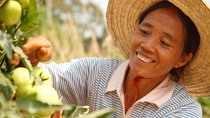
BASF has very much adapted to the local conditions in China while strengthening its investments in agricultural innovation.
“The agricultural mode of China is quite different from that of western countries or Japan,” Wu said. “Solutions ignoring the local conditions simply won’t work.” When talking about the characteristics of the developed western countries, the first thing that comes to people’s minds may be the boundless land, and it is normal for a couple to manage many hectares of farmland. Japan’s agriculture, in contrast, is characterized by high allowances and high food prices. Neither applies to China.
“There are few large swathes of farmland in China, and each region has its own features in terms of agriculture,” Wu said. “For instance, the vegetable production bases at Shouguang, Shandong province, are labor-intensive with many glass greenhouses to be taken care of in winter. Considering the frequent natural disasters, agricultural production may involve extremely high risks in the rice producing areas of the Yangtze Delta – one careless mistake could result in a year of scarcity.” She adds how to improve production efficiency remains the greatest challenge for China agriculture.
To promote the development of the country’s agriculture, BASF offers complete solutions adapted to local conditions. Barrel containers, for example, are changed into smaller bottles. In May, BASF announced that a new formulation and packaging plant will be established at Yangkou Chemical Park, Rudong County, Jiangsu province. The plant, with an annual capacity of 10,000 metric tons, is expected to be fully operational in 2014. BASF is also establishing Agro-solution Farms in China to develop crop protection formulations suitable to local climate conditions.
To promote the sustainable development of China’s agriculture, BASF and China National Cereals, Oils and Foodstuffs Corp. Tunhe, one of the world’s largest tomato producers and processors, initiated sustainability research of AgBalance™ at Tunhe, Xinjiang. It aimed to specify potential improvement strategies based on a sustainability performance study at a tomato farm focused on the use of nutrients and plant protection products.
While focusing on its own development, BASF is committed to cooperation with its Chinese partners including government organizations, universities and research institutes. “China’s agriculture sector has very special channels of production. Over 500,000 retailers are playing an important role in helping farmers to solve various problems,” Wu said. “BASF is supporting and training them, hoping they could provide better products and solutions to the farmers instead of being driven by interests.”
Despite the challenges, BASF has increasingly been accepted and recognized by China’s agriculture sector. According to Chung, BASF has grown its market position in crop protection segment. Such growth is expected to continue in the next few years thanks to the continuous investment.
BASF is raising the long-term sales target for its Crop Protection division and now expects it to achieve sales of more than €6 billion by 2015 and €8 billion by 2020 (previously: €6 billion by 2020). To support this, BASF will invest approximately €1.8 billion to build and upgrade production and formulation capacities between 2013 and 2017. BASF will also continue to expand its portfolio of solutions and increase initiatives that support growers with their overall farm management.
Increased investments in innovative solutions
For the period from 2013 to 2017, BASF will double its annual investment in production plants for its Crop Protection division from approximately €150 million to more than €300 million. BASF is also planning to build new or expand existing formulation plants at several sites around the world, with strong emphasis on Asia.
Portfolio expansion through Functional Crop Care
Functional Crop Care, BASF’s newly- established unit for solutions beyond traditional crop protection products, will greatly expand BASF’s portfolio of solutions for growers.
